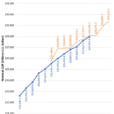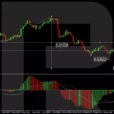During a speech made today, the Bank of Japan’s Kuroda announced that there are currently no significant financial imbalances on Japanese markets. This shows that Kuroda has no intention of applying an aggressive loosening of monetary policy. The BoJ governor also hinted that in principle he doesn’t quite agree with the use of monetary policy in the fight against financial imbalances. The Bank is in no need of experiments with negative deposit rates to stimulate credit flows since the Japanese’s extensive asset purchasing program has already brought about negative returns on short-term state bonds. Kuroda made his statement just after the ECB decided to drop its rate from -0.2% to -0.3% at its 3rd December meeting.
The next time the regulator is set to convene is on 16th-17th December, immediately following the US Fed. It’s likely that the BoJ will leave their monetary policy unchanged.
Tomorrow will see the publication of Japanese economic growth figures for the third quarter.
According to data published today, industrial production in Germany throughout October (with correction for seasonal factors) rose 0.2% MoM (forecasted: 0.5%). Growth in industrial manufacturing and in construction was partially nullified by the fall in manufacturing in the energy sector. The industrial manufacturing data was yet another indicator to rise and in doing show shows that German economic growth is speeding up after a weak third quarter. The YoY growth was, however, zero.
The euro/dollar is down slightly to 1.0817 after a growth due to the ECB’s 3rd December decision on monetary policy which wasn’t as extensive as the market had expected. In the long-term, differences between ECB and US Fed monetary policies will push the pair downwards.
Today it’s worth giving some of your attention to what Mark Carney of the Bank of England has to say and then what US Fed member James Bullard has to say.











Leave A Comment